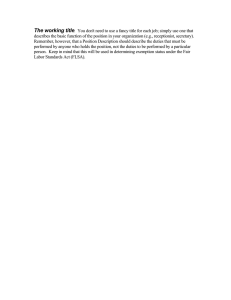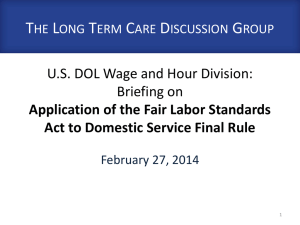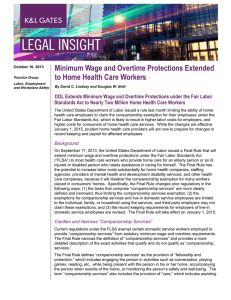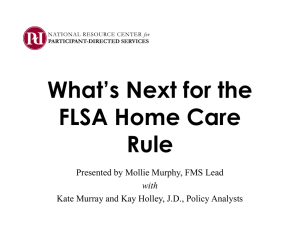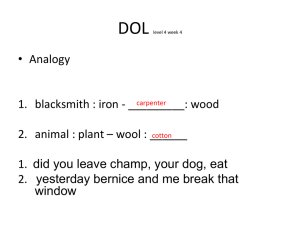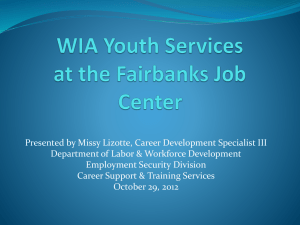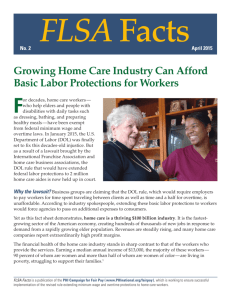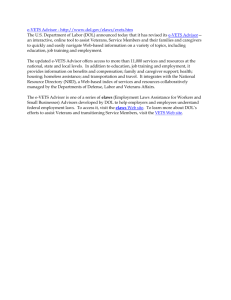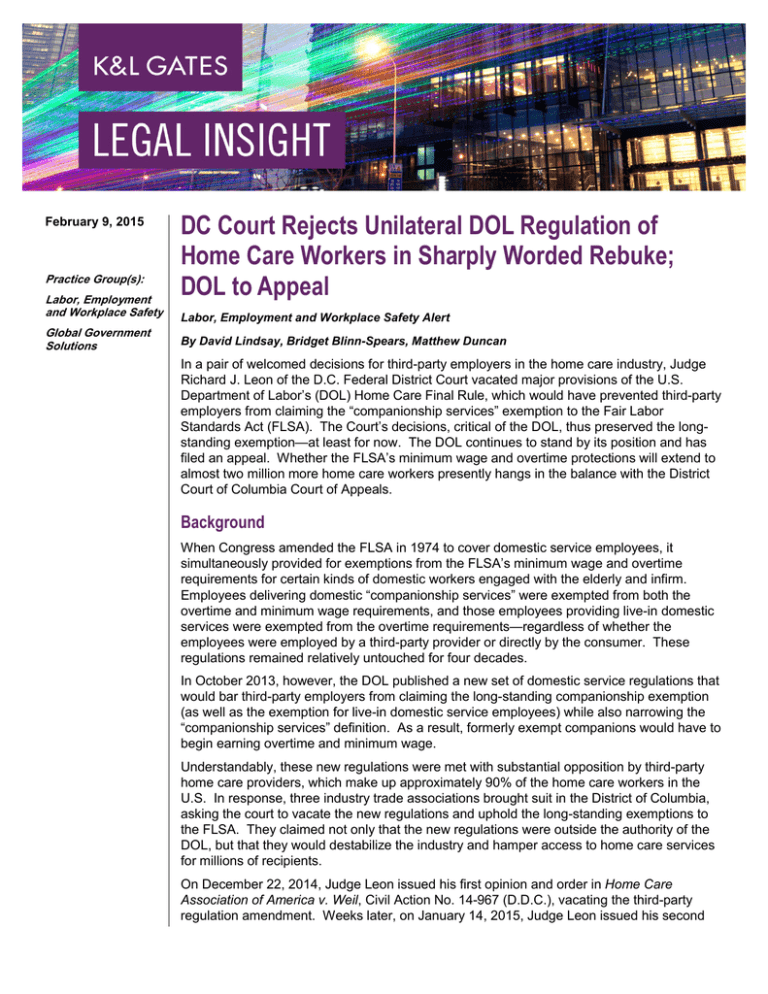
February 9, 2015
Practice Group(s):
Labor, Employment
and Workplace Safety
Global Government
Solutions
DC Court Rejects Unilateral DOL Regulation of
Home Care Workers in Sharply Worded Rebuke;
DOL to Appeal
Labor, Employment and Workplace Safety Alert
By David Lindsay, Bridget Blinn-Spears, Matthew Duncan
In a pair of welcomed decisions for third-party employers in the home care industry, Judge
Richard J. Leon of the D.C. Federal District Court vacated major provisions of the U.S.
Department of Labor’s (DOL) Home Care Final Rule, which would have prevented third-party
employers from claiming the “companionship services” exemption to the Fair Labor
Standards Act (FLSA). The Court’s decisions, critical of the DOL, thus preserved the longstanding exemption—at least for now. The DOL continues to stand by its position and has
filed an appeal. Whether the FLSA’s minimum wage and overtime protections will extend to
almost two million more home care workers presently hangs in the balance with the District
Court of Columbia Court of Appeals.
Background
When Congress amended the FLSA in 1974 to cover domestic service employees, it
simultaneously provided for exemptions from the FLSA’s minimum wage and overtime
requirements for certain kinds of domestic workers engaged with the elderly and infirm.
Employees delivering domestic “companionship services” were exempted from both the
overtime and minimum wage requirements, and those employees providing live-in domestic
services were exempted from the overtime requirements—regardless of whether the
employees were employed by a third-party provider or directly by the consumer. These
regulations remained relatively untouched for four decades.
In October 2013, however, the DOL published a new set of domestic service regulations that
would bar third-party employers from claiming the long-standing companionship exemption
(as well as the exemption for live-in domestic service employees) while also narrowing the
“companionship services” definition. As a result, formerly exempt companions would have to
begin earning overtime and minimum wage.
Understandably, these new regulations were met with substantial opposition by third-party
home care providers, which make up approximately 90% of the home care workers in the
U.S. In response, three industry trade associations brought suit in the District of Columbia,
asking the court to vacate the new regulations and uphold the long-standing exemptions to
the FLSA. They claimed not only that the new regulations were outside the authority of the
DOL, but that they would destabilize the industry and hamper access to home care services
for millions of recipients.
On December 22, 2014, Judge Leon issued his first opinion and order in Home Care
Association of America v. Weil, Civil Action No. 14-967 (D.D.C.), vacating the third-party
regulation amendment. Weeks later, on January 14, 2015, Judge Leon issued his second
DC Court Rejects Unilateral DOL Regulation of Home Care Workers in Sharply
Worded Rebuke; DOL to Appeal
opinion and order vacating the new regulation’s revised definition of “companionship
services.” The Court preserved the long-standing exemptions from the FLSA’s overtime and
minimum age provisions in two blistering opinions highly critical of the DOL.
The Court’s Blistering Opinions
In its reasoning, the Court noted that the original regulations remained substantially
unchanged for 40 years after they were initially promulgated. The Court noted that although
three consecutive Congressional committees considered several bills seeking to abolish the
exemption, none of these bills reached the floor of either house of Congress. The court
unequivocally chastised the DOL for attempting to overstep its authority:
Six bills were introduced—three in the House of Representatives, three in the
Senate—over the course of three Congressional sessions, where sponsors
were in the majority party of each, yet there was never sufficient support to
get any of them to the floor of either house of Congress. This unequivocally
represents a lack of Congressional intent to withdraw the exemption from
third-party employers. The fact that the Department issued its Notice of
Proposed rulemaking after all six of these bills failed to move is nothing short
of yet another thinly veiled effort to do through regulation what could not be
done through legislation. Such conduct bespeaks an arrogance to not only
disregard Congress’s intent, but seize unprecedented authority to impose
overtime and minimum wage obligations in defiance of the plain language [of
the FLSA]. It cannot stand.
The court acknowledged that Congress was concerned with the nature of the services
employees were providing—enabling guardians of the elderly and disabled to financially
afford to have their wards cared for in their own private homes as opposed to
institutionalizing them—rather than whether their pay was routed through a third-party
employer. The Court found that the DOL’s regulations ignored Congress’s clear intent and
contravened the FLSA’s language regarding exemptions, and vacated the portion of the
regulation that would have restricted third-party home care providers from taking advantage
of the “companionship services” exemption.
On January 14, 2015, Judge Leon issued his second opinion and order, this time vacating
the portion of the new regulation that would have imposed a narrower definition upon the
type of work considered to fall under “companionship services.” Under the new regulation,
employers wishing to rely on the companionship exemption would have to ensure (1) that the
time caregivers spend performing “care” services, defined as assistance with “activities of
daily living” like dressing, feeding and bathing, did not exceed 20 percent of their weekly
hours per patient per week, and (2) that caregivers did not perform any general household
work. This would have severely restricted most employers’ ability to avail themselves of the
companionship exemption.
The trade associations argued that this new, narrower definition of companionship services
violated the language and legislative intent of the FLSA because it “removes ‘care’ for all
practical purposes, from the regulatory definition.”
In the second opinion, the Court echoed its earlier reasoning, observing that the longstanding regulation was left untouched by Congress for 40 years without Congress having
“shown one iota of interest in cabining the definition of companionship services…”. The
2
DC Court Rejects Unilateral DOL Regulation of Home Care Workers in Sharply
Worded Rebuke; DOL to Appeal
Court held, “Here, yet again, the Department is trying to do through regulation what must be
done through legislation … And, therefore, it too must be vacated.”
Conclusion
Whether third-party employers may avail themselves of the FLSA companionship and live-in
exemptions in the long run remains to be seen. For now, Judge Leon’s decisions are at least
a temporary victory for third-party home care employers. Employers should keep in mind,
however, that the decisions do not affect state wage and hour laws that affect these same
employees.
Authors:
David Lindsay
david.lindsay@klgates.com
+1.919.743.7304
Bridget Blinn-Spears
bridget.blinn-spears@klgates.com
+1.919.743.7350
Matthew Duncan
matthew.d.duncan@klgates.com
+1.919.743.7329
Anchorage Austin Beijing Berlin Boston Brisbane Brussels Charleston Charlotte Chicago Dallas Doha Dubai Fort Worth Frankfurt
Harrisburg Hong Kong Houston London Los Angeles Melbourne Miami Milan Moscow Newark New York Orange County Palo Alto Paris
Perth Pittsburgh Portland Raleigh Research Triangle Park San Francisco São Paulo Seattle Seoul Shanghai Singapore Spokane
Sydney Taipei Tokyo Warsaw Washington, D.C. Wilmington
K&L Gates comprises more than 2,000 lawyers globally who practice in fully integrated offices located on five
continents. The firm represents leading multinational corporations, growth and middle-market companies, capital
markets participants and entrepreneurs in every major industry group as well as public sector entities, educational
institutions, philanthropic organizations and individuals. For more information about K&L Gates or its locations,
practices and registrations, visit www.klgates.com.
This publication is for informational purposes and does not contain or convey legal advice. The information herein should not be used or relied upon in
regard to any particular facts or circumstances without first consulting a lawyer.
© 2015 K&L Gates LLP. All Rights Reserved.
3

